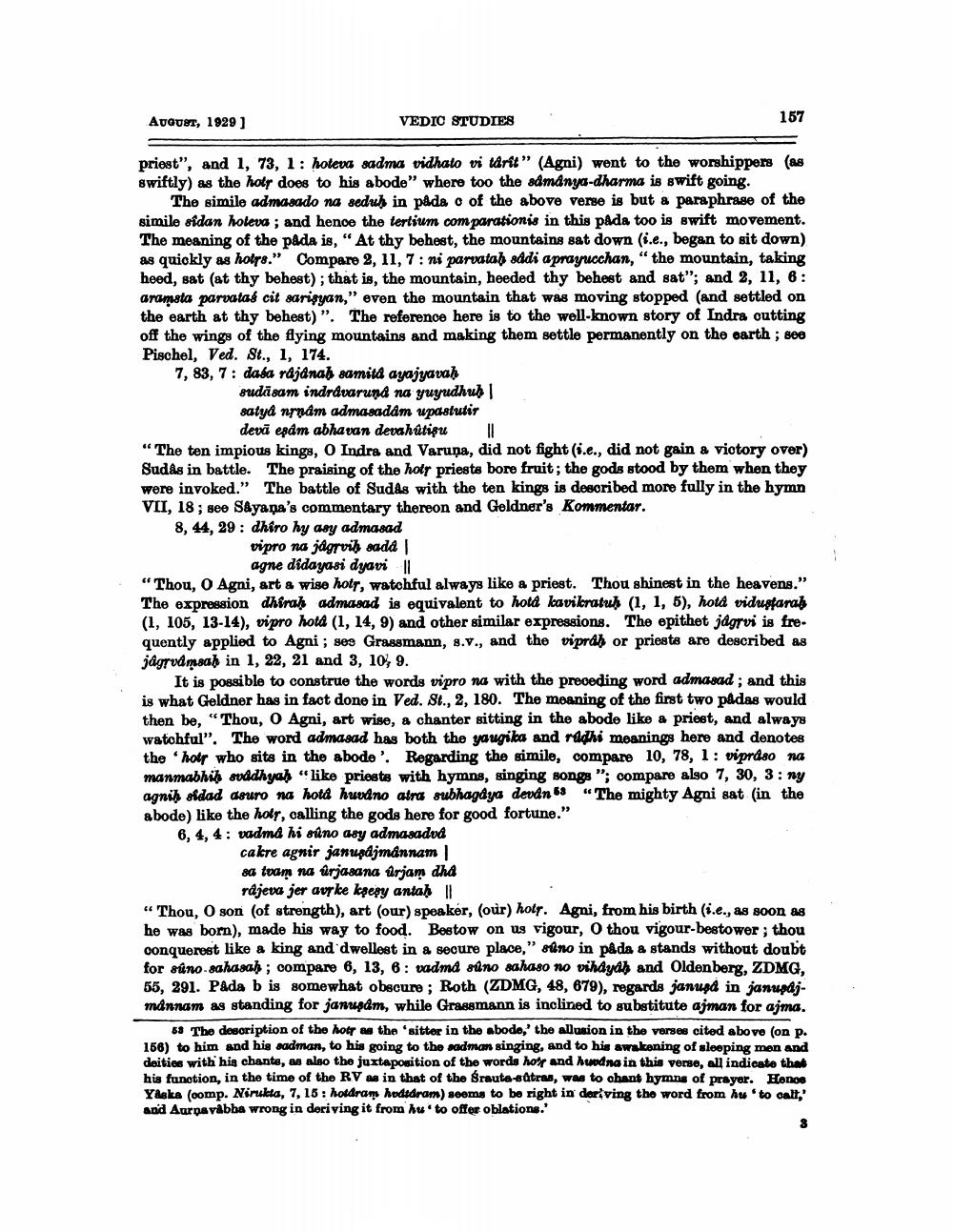________________
AUGUST, 1929]
VEDIC STUDIES
priest", and 1, 73, 1: hoteva sadma vidhato vi tarit" (Agni) went to the worshippers (as swiftly) as the holy does to his abode" where too the sámánya-dharma is swift going.
The simile admasado na seduh in påda c of the above verse is but a paraphrase of the simile sidan holeva; and hence the tertium comparationis in this pada too is swift movement. The meaning of the pada is, "At thy behest, the mountains sat down (i.e., began to sit down) as quickly as hotrs." Compare 2, 11, 7: ni parvataḥ sádi aprayucchan," the mountain, taking heed, sat (at thy behest); that is, the mountain, heeded thy behest and sat"; and 2, 11, 6: aramsta parvatas cit sarisyan," even the mountain that was moving stopped (and settled on the earth at thy behest)". The reference here is to the well-known story of Indra outting off the wings of the flying mountains and making them settle permanently on the earth; see Pischel, Ved. St., 1, 174.
7, 83, 7: dasa rájánaḥ samitâ ayajyavaḥ
sudāsam indravarund na yuyudhuḥ | satya nrnám admasadam upastutir deva eşâm abhavan devahûtişu
157
||
"The ten impious kings, O Indra and Varuna, did not fight (i.e., did not gain a victory over) Sudas in battle. The praising of the hotr priests bore fruit; the gods stood by them when they were invoked." The battle of Sudas with the ten kings is described more fully in the hymn VII, 18; see Sayana's commentary thereon and Geldner's Kommentar.
8, 44, 29: dhiro hy asy admasad
vipro na jágrvih sada |
agne didayasi dyavi ||
"Thou, O Agni, art a wise hoty, watchful always like a priest. Thou shinest in the heavens." The expression dhirah admasad is equivalent to hota kavikratuḥ (1, 1, 5), hotd viduştarah (1, 105, 13-14), vipro hota (1, 14, 9) and other similar expressions. The epithet jagrvi is frequently applied to Agni; see Grassmann, s.v., and the vipráh or priests are described as jagrvamsah in 1, 22, 21 and 3, 10, 9.
It is possible to construe the words vipro na with the preceding word admasad; and this is what Geldner has in fact done in Ved. St., 2, 180. The meaning of the first two pâdas would then be, "Thou, O Agni, art wise, a chanter sitting in the abode like a priest, and always watchful". The word admasad has both the yaugika and radhi meanings here and denotes the hot who sits in the abode'. Regarding the simile, compare 10, 78, 1: vipraso na manmabhiḥ svádhyaḥ "like priests with hymns, singing songs"; compare also 7, 30, 3: ny agniḥ sidad asuro na hota huváno atra subhagdya deváns "The mighty Agni sat (in the abode) like the hoty, calling the gods here for good fortune."
6, 4, 4: vadma hi sûno asy admasadva
cakre agnir januşájmânnam |
sa tvam na úrjasana ûrjam dha rajeva jer avrke kṣery antaḥ ||
"Thou, O son (of strength), art (our) speaker, (our) hoty. Agni, from his birth (i.e., as soon as he was born), made his way to food. Bestow on us vigour, O thou vigour-bestower; thou conquerest like a king and dwellest in a secure place," sûno in påda a stands without doubt for suno sahasah; compare 6, 13, 6: vadmá sûno sahaso no vihdyáḥ and Oldenberg, ZDMG, 55, 291. Pada b is somewhat obscure; Roth (ZDMG, 48, 679), regards janusa in janusájmánnam as standing for janusâm, while Grassmann is inclined to substitute ajman for ajma.
53 The description of the hotr as the 'sitter in the abode,' the allusion in the verses cited above (on p. 156) to him and his sadman, to his going to the sadman singing, and to his awakening of sleeping men and deities with his chants, as also the juxtaposition of the words hot and hundna in this verse, all indicate that his function, in the time of the RV as in that of the Sraute-sutras, was to chant hymns of prayer. Hence Yaska (comp. Nirukta, 7, 15: hotáram hoátáram) seems to be right in deriving the word from hu 'to call,' and Aurpavabha wrong in deriving it from hu' to offer oblations.'




